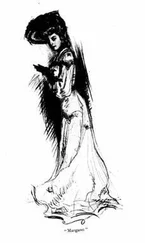James Cabell - The Cords of Vanity. A Comedy of Shirking
Здесь есть возможность читать онлайн «James Cabell - The Cords of Vanity. A Comedy of Shirking» весь текст электронной книги совершенно бесплатно (целиком полную версию без сокращений). В некоторых случаях можно слушать аудио, скачать через торрент в формате fb2 и присутствует краткое содержание. Жанр: Современная проза, на английском языке. Описание произведения, (предисловие) а так же отзывы посетителей доступны на портале библиотеки ЛибКат.
- Название:The Cords of Vanity. A Comedy of Shirking
- Автор:
- Жанр:
- Год:неизвестен
- ISBN:нет данных
- Рейтинг книги:3 / 5. Голосов: 1
-
Избранное:Добавить в избранное
- Отзывы:
-
Ваша оценка:
- 60
- 1
- 2
- 3
- 4
- 5
The Cords of Vanity. A Comedy of Shirking: краткое содержание, описание и аннотация
Предлагаем к чтению аннотацию, описание, краткое содержание или предисловие (зависит от того, что написал сам автор книги «The Cords of Vanity. A Comedy of Shirking»). Если вы не нашли необходимую информацию о книге — напишите в комментариях, мы постараемся отыскать её.
The Cords of Vanity. A Comedy of Shirking — читать онлайн бесплатно полную книгу (весь текст) целиком
Ниже представлен текст книги, разбитый по страницам. Система сохранения места последней прочитанной страницы, позволяет с удобством читать онлайн бесплатно книгу «The Cords of Vanity. A Comedy of Shirking», без необходимости каждый раз заново искать на чём Вы остановились. Поставьте закладку, и сможете в любой момент перейти на страницу, на которой закончили чтение.
Интервал:
Закладка:
When I had done so, Bettie shook her head. "Oh, Robin, Robin!" she said, "how did I ever come to raise a child that doesn't know his own mind for as much as two minutes? And how dared that Barry-Smith person to slap you, I would like to know."
"Now you're jealous, Bettie. You are thinking she infringed upon an entirely personal privilege, and you resent it."
"Well,—but I've the right to, you see, and she hadn't. I consider her to be a bold-faced jig. And I don't approve of this Avis person either, you understand; but we poor mothers are always being annoyed by slushy, mushy Avises. I suppose there's a reason for it. She'll throw you over, you know, as soon as her mother has had an inning or two. That's why she took her to Europe," Bettie explained, with a fine confusion of personalities. "Only she just wanted any quiet place where she could take aromatic spirits of ammonia and point out between doses that she has given up her entire life to her child and has never made any demands on her and hasn't the strength to argue with her, because her heart is simply broken. We mothers always say that; and the funny part is that if you say it often enough it invariably works far better than any possible argument."
I told her she was talking nonsense, and she said, irrelevantly enough: "Setebos, and Setebos, and Setebos! I don't think very highly of Setebos sometimes, because He muddles things so. Oh, well, I shan't cry Willow. Besides there aren't any sycamore-trees in the garden. So let's go into the garden, dear. That sounds as if I ate in the back pantry, doesn't it? Of course you aren't of any account any more, and you never will be, but at least you don't look at people as though they were a new sort of bug whenever they have just thought a sentence or two and then gone on, without bothering to say it."
So we went into Bettie's garden. It had not changed….
6
Nothing had changed. It was as though I had somehow managed, after all, to push back the hands of the clock. Fairhaven accepted me incuriously. I was only "an old student." In addition, I was vaguely rumoured to write "pieces" for the magazines. Probably I did; "old students" were often prone to vagaries after leaving King's College; for instance, they told me, Ralph Means was a professional gambler, and Ox Selwyn had lately gone to Shanghai and had settled there,—and Shanghai, in common with most other places, Fairhaven accorded the negative tribute of just not absolutely disbelieving in its existence.
Nothing had changed. The Finals were over; and with the noisy exodus of the college-boys, Fairhaven had sunk contentedly into an even deeper stupor, as Fairhaven always does in summer. And, for the rest, the unpaved sidewalks were just as dusty, the same deep ruts and the puddles which never dry, not even in mid-August, adorned Fairhaven's single street; the comfortable moss upon Fairhaven's roofs had not varied by a shade; and George Washington or Benjamin Franklin might have stepped out of any one of those brass-knockered doorways without incongruity and without finding any noticeable innovation to marvel at.
Nothing had changed. In the precise middle of the campus Lord Penniston, our Governor in Colonial days, still posed, in dingy marble; and the fracture of the finger I had inadvertently broken off, the night that Billy Woods and I painted the statue all over, in six colours, was white and new-looking. Kathleen Eppes had married her Spaniard and had left Fairhaven; otherwise the same girls were already planning their toilets for the Y.M.C.A. reception in October, which formally presents the "new students" to society at large; and presently these girls would be going to the germans or the Opera House with the younger brother of the boy who used to take them thither….
Nothing had changed; not even I was changed. For I had soon discovered that Bettie Hamlyn did not care a pin for me in myself. She was simply very fond of me because, at times, I reminded her of a boy who had gone to King's College; and her reception of me, for the first two days, was unmistakably provisional.
"Very well!" I said.
And I did it. For I knew how difficult it was to deceive Bettie, and in consequence all my faculties rose to the challenge. I did not merely mimic my former self, I was compelled, almost, to believe I was indeed that former self, because not otherwise could I get Bettie Hamlyn's toleration. Had I paused even momentarily to reflect upon the excellence of my acting, she would have known. So I resolutely believed I was being perfectly candid; and with constant use those older tricks of speech and gesture and almost of thought, at first laborious mimicry, became well-nigh involuntary.
In fine, we could not wipe away five years, but with practice we found that you would very often forget them, and for quite a while….
I had explained to Bettie's father I was going to board with them that summer. Had I not been so haphazard in the progress of this narrative, I would have earlier announced that Bettie's father was the Latin professor at King's College. He was very old and vague, and his general attitude toward the universe was that of remote recollection of having noticed something of the sort before. Professor Hamlyn, therefore, told me he was glad to hear of my intended stay beneath his roof; hazarded the speculation that I had written a book which he meant to read upon the very first opportunity; blinked once or twice; and forthwith lapsed into consideration of some Pliocene occurrence which, if you were to judge by the expression of his mild old countenance, he did not find entirely satisfactory….
So I spent three months in Fairhaven; and Bettie and I read all the old books over again, and were perfectly happy.
7
And what I wrote in those last five chapters of my book was so good that in common decency I was compelled to alter the preceding twenty-nine and bring them a bit nearer to Bettie's standard. For I was utilising Bettie's ideas. She did not have the knack of putting them on paper; that was my trivial part, as I now recognised with a sort of scared reverence.
"Of course, though, you had to meddle," I would scold at her. "I had meant the infernal thing to be a salable book. To-day it is just a stenographic report of how these people elected to behave. I haven't anything to do with it. I wash my hands of it. I consider you, in fine, a cormorant, a conscienceless marauder, a meddlesome Mattie, and a born dramatist."
"But, it's much better than anything you've ever done, Robin—"
"That is what I'm grumbling about. I consider it very unfeeling of you to write better novels than I do," I retorted. "But, oh, how good that scene is!" I said, a little later.
"Let's see—'For you, dear clean-souled girl, were born to be the wife of a strong man, and the mother of his dirty children'—no, it's 'sturdy', but then you hardly ever cross your T's. And where he goes on to tell her he can't marry her, because he is artistic, and she is too practical for them to be real mates, and all that other feeble-mindedness? Dear me, did I forget to tell you we were going to cut that out?"
"But I particularly like that part—"
"Do you?" said Bettie, as her pen scrunched vicious lines through it. Then she said: "I only hope she had the civility and self-control not to laugh until you had gone away. And 'We irrelevant folk that design all useless and beautiful things,' indeed! No, I couldn't have blamed her if she laughed right out. I wonder if you will never understand that what you take to be your love for beautiful things is really just a dislike of ugly ones? Oh, I've no patience with you! And wanting to print it in a book, too, instead of being content to make yourself ridiculous in tete-a-tetes with minxes that don't especially matter!"
Читать дальшеИнтервал:
Закладка:
Похожие книги на «The Cords of Vanity. A Comedy of Shirking»
Представляем Вашему вниманию похожие книги на «The Cords of Vanity. A Comedy of Shirking» списком для выбора. Мы отобрали схожую по названию и смыслу литературу в надежде предоставить читателям больше вариантов отыскать новые, интересные, ещё непрочитанные произведения.
Обсуждение, отзывы о книге «The Cords of Vanity. A Comedy of Shirking» и просто собственные мнения читателей. Оставьте ваши комментарии, напишите, что Вы думаете о произведении, его смысле или главных героях. Укажите что конкретно понравилось, а что нет, и почему Вы так считаете.



